寓乐于教,创造快乐的英语
2020 年人教版九年级英语全册知识点Unit6

2020人教版九年级英语全册知识点Unit6When was it invented?Section A1.pleasure可数乐事;高兴的事不可数高兴;愉快常用表达With pleasure乐意效劳My pleasure不用谢辨析pleasuren.高兴;乐趣pleasantadj.令人愉快的,强调事物本身的性质pleasedadj.感到高兴的, 强调人的心理2.such如此的;这样的句型such+a(an)+adj.+单数可数名词+that从句eg:He got such a bad cold that he coughed day and night.such+adj.+不可数名词+that从句eg:She has made such great progress that many people like her.such+adj.+名词复数+that从句eg:They are such interesting books that we all like them.辨析such修饰名词He is such a kind man.so修饰形容词或副词He is so kind a man.3.daily=every dayn.日报People's Daily《人民日报》4.mention提到;说到句型Don't mention it感谢道歉mention sb./sth.(to sb.)(向某人)提起某人或某事mention doing sth.提到做某事5.It is said that...据说……=People say that...相同结构It is reported that...据报道……It is supposed that...据猜测……It is believed that...人们认为……It's known that...众所周知……6.辨析take place指事先安排的事情eg: Great changes have taken place in our city over the years.happen指偶然发生的事情eg:An accident happened in that street.7.doubtwithout doubt毫无疑问;的确doubt sth.怀疑某事eg:No one doubts his ability.8.at a low price以低价eg:This sweater is on sale at a low price.9.translate翻译translate... into ...把……翻译成……eg:Don't translate everything into Chinese when you read English articles. Section B1.by mistake错误地;无意中eg:I took your bag by mistake.2.the Olympics=the Olympic Games语动词常用复数形式eg:The 30th Olympics were heldin London in 2012.3.divide...into把……分成……eg: The teacher divided us into four teams.4.stop句型stop ...from ...阻止……做某事eg: Nothing can stop China from being stronger and stronger.stop sb. from doing sth.= prevent sb. from doing sth.=keep sb. from doing sth.eg:Can you stop kids from playing Glory of Kings ?5.就近原则not only ... but also...neither...nor..既不……也不…… (两者都不)either...or...不是……就是……there be 结构6.look up to钦佩;仰慕=admireeg: Lots of kids look up to Li Yifeng nowadays.仰起头看……eg: The girl is so short that she has to look up to her elder sister.7.hero复数:+es以o结尾加-es变复数的名词黑人(Negro) 英雄(hero)爱吃西红柿 (tomato) 炒土豆(potato) Section A1.pleasure可数乐事;高兴的事不可数高兴;愉快常用表达With pleasure乐意效劳My pleasure不用谢辨析pleasuren.高兴;乐趣pleasantadj.令人愉快的,强调事物本身的性质pleasedadj.感到高兴的, 强调人的心理2.such如此的;这样的句型such+a(an)+adj.+单数可数名词+that从句eg:He got such a bad cold that he coughed day and night.such+adj.+不可数名词+that从句eg:She has made such great progress that many people like her.such+adj.+名词复数+that从句eg:They are such interesting books that we all like them.辨析such修饰名词He is such a kind man.so修饰形容词或副词He is so kind a man.3.daily=every dayn.日报People's Daily《人民日报》4.mention提到;说到句型Don't mention it感谢道歉mention sb./sth.(to sb.)(向某人)提起某人或某事mention doing sth.提到做某事5.It is said that...据说……=People say that...相同结构It is reported that...据报道……It is supposed that...据猜测……It is believed that...人们认为……It's known that...众所周知……6.辨析take place指事先安排的事情eg: Great changes have taken place in our city over the years.happen指偶然发生的事情eg:An accident happened in that street.7.doubtwithout doubt毫无疑问;的确doubt sth.怀疑某事eg:No one doubts his ability.8.at a low price以低价eg:This sweater is on sale at a low price.9.translate翻译translate... into ...把……翻译成……eg:Don't translate everything into Chinese when you read English articles. Section B1.by mistake错误地;无意中eg:I took your bag by mistake.2.the Olympics=the Olympic Games语动词常用复数形式eg:The 30th Olympics were heldin London in 2012.3.divide...into把……分成……eg: The teacher divided us into four teams.4.stop句型stop ...from ...阻止……做某事eg: Nothing can stop China from being stronger and stronger.stop sb. from doing sth.= prevent sb. from doing sth.=keep sb. from doing sth.eg:Can you stop kids from playing Glory of Kings ?5.就近原则not only ... but also...neither...nor..既不……也不…… (两者都不)either...or...不是……就是……there be 结构6.look up to钦佩;仰慕=admireeg: Lots of kids look up to Li Yifeng nowadays.仰起头看……eg: The girl is so short that she has to look up to her elder sister.7.hero复数:+es以o结尾加es变复数的名词黑人(Negro) 英雄(hero)爱吃西红柿 (tomato) 炒土豆(potato)。
Unit2 Book7课堂教案设计(词汇)-张立志-山东临朐第二中学

Unit2 Book7课堂教案设计(词汇)临朐二中张立志【教学目标】使学生认知1.desire 2. sympathy n 3. envy 4. declare 5. favor1. leave ...alone 2. set aside 3. be bound to等词汇,并能灵活运用。
同时,通过课堂教学活动,激发学生对英语学习的兴趣。
【教学重点及难点】1.所学词汇的掌握及运用。
2.在真实情景下使用本课的知识点。
【教学方法】任务型教学为主进行诗化“教学”,知识的传输力求情景化,生活化,实践化。
寓乐于教,寓趣于学,以学生为主导,老师为指导。
在多媒体的辅助下,强调学生的主体性,主动性、互动性、和谐性,从而达到“乐”与“教”双赢的效果。
【教具准备】课件,多媒体,学案纸及相应的答题卡片和游戏卡片。
【教学过程】Step 1 Revision英语课堂游戏:耳语传句规则:每一纵排为一组,教师分别发给每一组最后一排的学生一张游戏卡,上面写着需要检查的一个句子,在教师说"开始"后,最后一排的学生用耳语把卡片上的内容告诉前面的学生,这位学生再把听到的内容告诉前面的学生…依次进行下去,最后第一排的学生把听到的句子写到黑板上,传得最快,最准确的组获胜,得一分。
【说明】这个环节是对上一节课的一个检查复习和回顾,所选句子与上节课的知识点相关,游戏结束后,老师结合卡片句子和同学进行有效互动回顾。
Step 2 leading in通过导入图片认识下面几个词 1.desire 2. sympathy n 3.envy 4.declare 5. favor1. leave ...alone 2. set aside 3. be bound to【说明】这个环节是让学生初始知识。
提高学习兴趣。
Step 3 Learning要求学生看学案,同时做知识点后面相关小题。
(这时教师板书复习内容),然后,和学生一块对答案,形式为学生抢答。
九年级英语第四单元单词笔记

九年级英语第四单元单词笔记本单词笔记将对九年级英语第四单元的重点单词进行详细解释和举例,帮助您更好地理解和掌握这些单词的用法。
1. humorous [ˈhjuːmərəs] 形容词,意为“有幽默感的;滑稽有趣的”例句:He is a humorous teacher and we all like him. (他是一位有幽默感的老师,我们都喜欢他。
)2. silent [ˈsaɪlənt] 形容词,意为“沉默的;寂静的”例句:She was silent for a moment. (她沉默了一会儿。
)3. helpful [ˈhelpfl] 形容词,意为“有用的;有帮助的”例句:This book is very helpful for my study. (这本书对我的学习很有帮助。
)4. from time to time 短语,意为“时常;有时”例句:I go fishing from time to time. (我有时去钓鱼。
)5. score [skɔː(r)] 名词,意为“得分;比分”例句:The final score of the game was 3-2. (比赛的最终比分是 3 比2。
)6. background [ˈbækɡraʊnd] 名词,意为“背景”例句:The job requires a knowledge of the historical background. (这份工作需要具备历史背景知识。
)7. interview [ˈɪntəvjuː] 名词,意为“采访;面试”;动词,意为“采访;面试”例句:I have an interview for a new job tomorrow. (明天我有一个新工作的面试。
)8. Asian [ˈeɪʃn] 形容词,意为“亚洲的;亚洲人的”例句:She is an Asian girl. (她是一个亚洲女孩。
冀教版英语九年级下Lesson 6
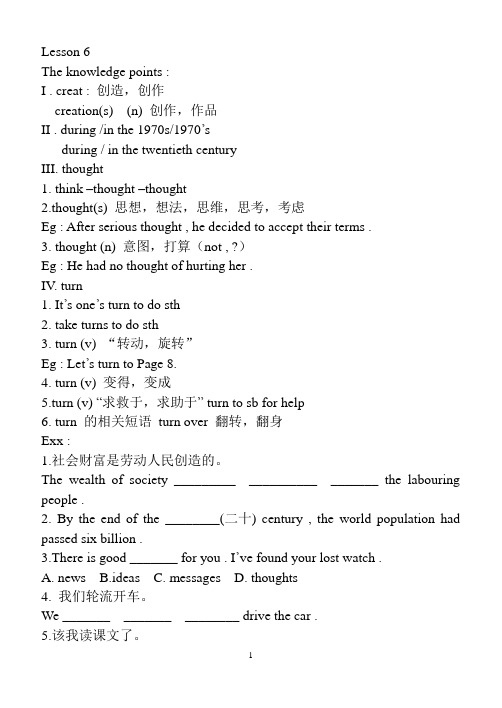
Lesson 6The knowledge points :I . creat : 创造,创作creation(s) (n) 创作,作品II . during /in the 1970s/1970’sduring / in the twentieth centuryIII. thought1. think –thought –thought2.thought(s) 思想,想法,思维,思考,考虑Eg : After serious thought , he decided to accept their terms .3. thought (n) 意图,打算(not , ?)Eg : He had no thought of hurting her .IV. turn1. It’s one’s turn to do sth2. take turns to do sth3. turn (v) “转动,旋转”Eg : Let’s turn to Page 8.4. turn (v) 变得,变成5.turn (v) “求救于,求助于” turn to sb for help6. turn 的相关短语turn over 翻转,翻身Exx :1.社会财富是劳动人民创造的。
The wealth of society _________ __________ _______ the labouring people .2. By the end of the ________(二十) century , the world population had passed six billion .3.There is good _______ for you . I’ve found your lost watch .A. newsB.ideasC. messagesD. thoughts4. 我们轮流开车。
We _______ _______ ________ drive the car .5.该我读课文了。
寓乐于教,激发学习兴趣进行英语教学论文

寓乐于教,激发学习兴趣进行英语教学【摘要】兴趣是英语学习的源泉和动力,保持浓厚的学习兴趣是英语学习的关键。
本文针对英语课堂教学中的问题,提出了教师在教学中不断地改进教学方法,强化学生的学习兴趣,使他们对英语乐学、善学、会学,形成稳定的学习动机。
【关键词】英语教学兴趣动机爱因斯坦说:“兴趣是最好的老师。
”一个成功的英语教师要在教学中有意识地培养学生对英语的持久兴趣,激励学生不断处于最佳的学习状态之中使他们对英语乐学、善学、会学,学而忘我,乐此不疲。
那么在英语教学中应如何激发学生的学习兴趣,使学生乐学、会学、善学、并养成良好的学习英语的习惯呢?作为一名英语教师,多年的从教活动中,我是从以下几个方面着手的:一、调整良好的心态,调动学习积极性学生的学习活动总是由一定的学习动机引起的,只有当学生喜欢学、要求学,有迫切的学习愿望时,才能自觉积极地投入到学习活动中去。
那么,学生的这种学习动机从何而来呢?这就要靠教师组织富有成效的学习活动去诱发学习动机、调动学习欲望。
我非常注重组织课前活动,通常以听说训练为主。
每天利用课前几分钟,让同学或个人,或同位,或三五人讲英文笑话,幽默故事,唱英文歌曲或表演平时听力内容中简单的模拟情景对话,例如吃饭、问路、旅游、工作面试等,时间一般不超过五分钟。
并且力争作到班内每个同学都有表演机会,即使个别程度稍差的后进生或性格较内向的学生不能自如的表现,也会积极的要么背诵一篇作文范文,要么甚至背诵一段所学的课文。
通过课前活动,使学生以轻松、愉快的心情迎来即将开始的英语课。
二、激发学生兴趣,好好把握课堂教学教学进程中,课堂教学是中心环节,只有把握好课堂教学,才是提高教学质量的关键。
(一)寓乐于教,轻松愉快学英语复旦大学教授陆谷孙提倡英语学习要pressure与pleasure相结合,否则枯燥无味的课堂和接踵而来的考试会扼杀了学生学英语的兴趣。
尤其我们的学生初中基础稍差,而高中教材难度增加,词汇量大大提高,不注意课堂教学,学生更容易失去学习兴趣,以至慢慢放弃。
玩得愉快的英语短语
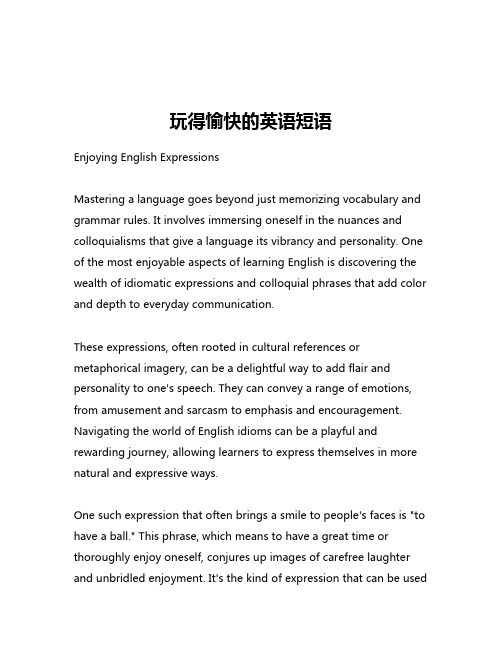
玩得愉快的英语短语Enjoying English ExpressionsMastering a language goes beyond just memorizing vocabulary and grammar rules. It involves immersing oneself in the nuances and colloquialisms that give a language its vibrancy and personality. One of the most enjoyable aspects of learning English is discovering the wealth of idiomatic expressions and colloquial phrases that add color and depth to everyday communication.These expressions, often rooted in cultural references or metaphorical imagery, can be a delightful way to add flair and personality to one's speech. They can convey a range of emotions, from amusement and sarcasm to emphasis and encouragement. Navigating the world of English idioms can be a playful and rewarding journey, allowing learners to express themselves in more natural and expressive ways.One such expression that often brings a smile to people's faces is "to have a ball." This phrase, which means to have a great time or thoroughly enjoy oneself, conjures up images of carefree laughter and unbridled enjoyment. It's the kind of expression that can be usedto describe a lively party, a thrilling adventure, or even a cozy evening spent with close friends. The imagery of a "ball" suggests a sense of boundless energy and joyful abandon, making it a delightful way to convey one's enthusiasm and zest for life.Another popular English expression that can add a touch of humor and playfulness to conversation is "to be a piece of cake." This idiom, which means something is easy or straightforward, often elicits chuckles from those who hear it. The comparison of a task to a simple dessert item like a slice of cake is both whimsical and effective in conveying a sense of effortlessness. It's the kind of expression that can be used to reassure someone who is feeling anxious about a challenge or to boast about one's own accomplishments in a lighthearted manner.One of the most versatile and endearing English expressions is "to be over the moon." This phrase, which means to be extremely happy or excited, conjures up vivid images of soaring through the sky and reveling in pure elation. It's the kind of expression that can be used to celebrate a significant life event, such as a graduation or a wedding, or to simply express genuine delight over a small but meaningful accomplishment. The imagery of being "over the moon" suggests a level of joy and enthusiasm that goes beyond the ordinary, making it a captivating and memorable way to conveyone's emotions.Another delightful English expression that can add a touch of whimsy to one's speech is "to be a couch potato." This idiom, which refers to someone who spends an excessive amount of time sitting on the couch and watching television, is both humorous and relatable. The visual of a person lounging on a couch, remote in hand, perfectly encapsulates the idea of a lazy or sedentary lifestyle. This expression can be used to tease a friend who is indulging in a binge-watching session or to gently poke fun at one's own tendency to prioritize rest and relaxation over physical activity.One of the most endearing English expressions is "to be a bookworm." This phrase, which describes someone who is deeply passionate about reading and literature, evokes a sense of intellectual curiosity and a love for the written word. The imagery of a person immersed in a book, oblivious to the world around them, is both charming and relatable. This expression can be used to compliment someone's love of learning, to bond over a shared appreciation for literature, or to gently tease a friend who is always found with their nose in a book.Another delightful English expression that can add a touch of playfulness to one's speech is "to let the cat out of the bag." This idiom, which means to reveal a secret or piece of information that was previously hidden, conjures up a whimsical visual of amischievous person setting a cat free from a bag. The expression can be used to describe a range of situations, from accidentally revealing a surprise to someone to intentionally disclosing a closely guarded secret. The playful imagery and the sense of unveiling something hidden make this expression a captivating and memorable way to communicate.One of the most endearing English expressions is "to be a night owl." This phrase, which describes someone who is more active and productive during the evening hours, evokes a sense of mystery and individuality. The imagery of a person thriving in the quiet of the night, unencumbered by the demands of the day, is both intriguing and relatable. This expression can be used to celebrate one's unique circadian rhythm, to bond with fellow night owls, or to gently tease a friend who prefers to stay up late and sleep in.Another delightful English expression that can add a touch of humor and whimsy to one's speech is "to be a big cheese." This idiom, which refers to a person of importance or influence, conjures up a playful visual of a large, round cheese wheel. The comparison of a person to a cheese, while seemingly unusual, is both amusing and effective in conveying a sense of status and authority. This expression can be used to acknowledge someone's accomplishments, to tease a friend who is feeling a bit too important, or to describe a powerful individual in a lighthearted and memorable way.These are just a few examples of the many delightful English expressions that can add color, personality, and playfulness to one's language. Mastering these idiomatic phrases is not only a rewarding aspect of learning English but also a way to connect with the culture and the people who use the language. By embracing the rich tapestry of English expressions, language learners can not only improve their fluency but also cultivate a deeper understanding and appreciation for the nuances and subtleties that make the English language so vibrant and engaging.。
人教版九年级英语unit9知识点
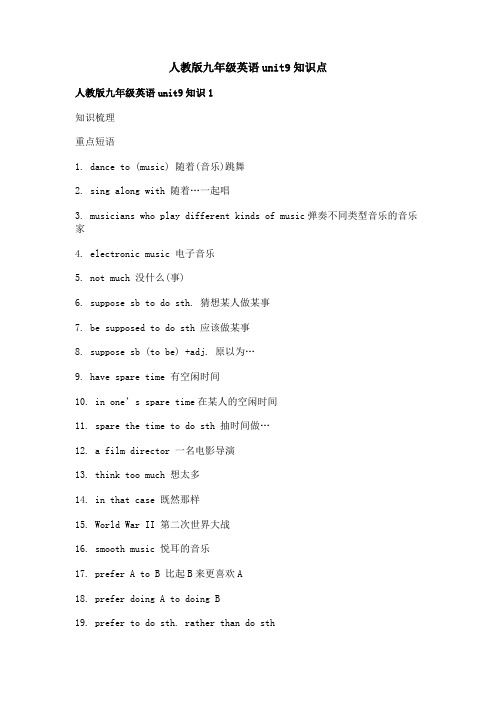
人教版九年级英语unit9知识点人教版九年级英语unit9知识1知识梳理重点短语1. dance to (music) 随着(音乐)跳舞2. sing along with 随着…一起唱3. musicians who play different kinds of music弹奏不同类型音乐的音乐家4. electronic music 电子音乐5. not much 没什么(事)6. suppose sb to do sth. 猜想某人做某事7. be supposed to do sth 应该做某事8. suppose sb (to be) +adj. 原以为…9. have spare time 有空闲时间10. in one’s spare time在某人的空闲时间11. spare the time to do sth 抽时间做…12. a film director 一名电影导演13. think too much 想太多14. in that case 既然那样15. World War II 第二次世界大战16. smooth music 悦耳的音乐17. prefer A to B 比起B来更喜欢A18. prefer doing A to doing B19. prefer to do sth. rather than do sth.20. feel like doing sth 想要做某事21. stick to 坚持,固守22. be down 悲哀,沮丧23. cheer sb up 使… 高兴/ 振奋24. have a happy ending 有个美满的结局25. try one’s best to do sth. 尽某人最大努力做…26. less serious 不那么严重27. a good way to do sth 做某事的好办法28. make me feel even sadder 让我感觉更伤心29. provide plenty of information about a certain subject提供了大量的关于某个主题的信息30. shut off my brain 关闭我的大脑重点句型1. I love singers who write their own music.我喜欢自己创作曲子的歌手。
论英语的寓乐于教

论英语的寓乐于教摘要:如何将英语的学习变得生动又有效,学生和老师都“乐”享其中是当代英语学习者共同追求的目标。
“寓教于乐”的主张也成为英语教育重要指导思想,可以理解为教育在教予知识的同时给人收益和乐趣。
当然,英语学习的过程更要寓乐于教,这样从寓乐于教到寓教于乐既享受了过程又收获了硕果。
要做到寓乐于教就要做到寓教于良好的师生关系,寓教于灵活的教学方式,寓教于真实的语言环境。
寓教于良好的师生关系是保证英语学习有兴趣的前提和重要保障。
寓教于灵活的教训方式可以全面提高学是各方面素质,在保证学习到课本知识之余体验各式各样的教学方式也将会成为开启学生思维的,开发其潜能,锻炼各种能力的有效途径。
寓教于真实的语言环境是英语学习的出发点和目的所在。
关键词:寓乐于教寓教于乐尊重关爱灵活语言环境中图分类号:g633 文献标识码:a 文章编号:1673-9795(2012)10(c)-0191-01在各个领域都离不开国际交流今天,英语的使用日渐频繁,追求英语学习的效率也成为众多教学者研究的重点。
如何将英语的学习变得生动又有效,学生和老师都“乐”享其中是当代英语学习者共同追求的目标。
古罗马的美学家兼文艺理论家贺拉斯提出“寓教于乐”的主张也成为英语教育重要指导思想,可以理解为教育在教予知识的同时给人收益和乐趣。
当然,英语学习的过程更要寓乐于教,这样从寓乐于教到寓教于乐即享受了过程又收获了硕果。
要做到寓乐于教就要做到寓教于良好的师生关系,寓教于灵活的教学方式,寓教于真实的语言环境。
1 寓教于良好的师生关系寓教于良好的师生关系是保证英语学习有兴趣的前提和重要保障。
受中国千百年来“严师出高徒”传统思想的熏陶,加上“应试教育”的沉重压力师生关系往往被误解和扭曲。
师者,所以传道授业解惑也,父母赐予子女生命,老师教书育人,用“师徒如父子”来形容完全不为过。
师生关系主要在教学活动的各方各面中展开并形成,作为贯穿全校人际关系,它维系着一个班一个年级乃至一个学校和谐秩序,和谐的师生关系是保证教学活动树立的有力保障,可以提高老师的教学以及学生学习的质量和积极性,反之,则会带来各种消极后果。
英语教学中的寓乐于教

英语教学中的寓乐于教
新蔡县涧头中学杨振新
所谓的寓乐于教,就是学生快乐地学习,乐意地接受教师所传授的知识。
相应把教师在教学中理应生动活泼地面向学生传授知识。
英语这一科目本身就是一门很“活泼”学科,相应地快乐教学法更是英语教学的必然。
寓乐于教的英语教学法是英语教学的时代体现,传统的英语教学学生死记、死背,纯粹地为应试而学习英语,而试毕,学生则将英语抛之九宵云外。
现代的经济发展,则需英语的灵活性、多变性、持久性,作为现代的英语教师就应跟着时代的步伐快乐地将所的知识,传授给学生。
而且让学生乐意地接受教师传授的知识。
为此,英语教师对教材除详细认真地讲解给学生,更主要地是让学生欣然接受,更能准确、全面地运用于生活实际中去。
举例说罢,苹果这个词,学生大多喜欢吃,而且司空见惯,这就不单单地让学生记着这个单词,而且作为交际,让学生很友好地奉献给别人“Here you are”而没有得到的则是“Thank you very much”,这样学生不仅记住了苹果“apple”这个词,更能准确进行交际,从而更增强了学生对apple的喜爱。
现代的英语教学是全面的教,学生纵向与横向地学,这就要求教师的快乐教学法,让学生主动地欣然接受,并实际
地与他人沟建。
寓乐于教是英语教学中的必然,更是时代对英语教学的需求。
作为新时代的英语教师,不仅要全面地巩固个人的专业知识,更应该注重兴趣教学,更注重于学生能力的培养及社会实际的操作与运用,能充分地将所学的英语知识和掌握的基本技能,随时随地运用到现实生活中,这样以来,寓乐于教难道不是素质教育在新时代对英语教学提出严峻考验吗?。
人教版九年级英语第六单元Unit6 sectionA知识点精讲
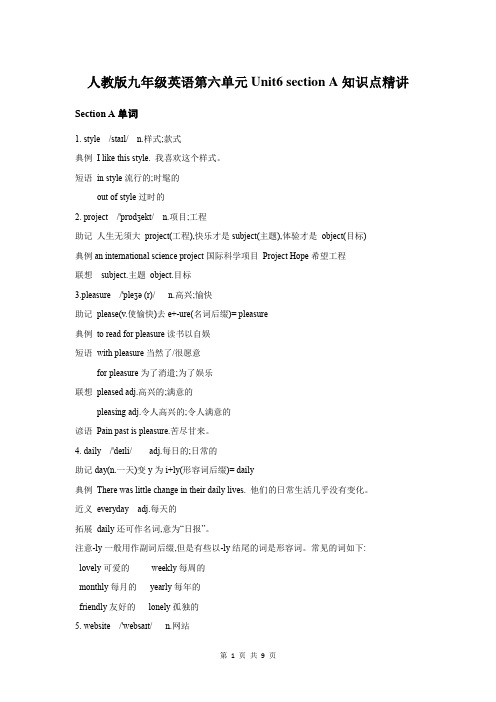
人教版九年级英语第六单元Unit6 section A知识点精讲Section A单词1. style /staɪl/ n.样式;款式典例I like this style. 我喜欢这个样式。
短语in style流行的;时髦的out of style过时的2. project /'prɒdʒekt/ n.项目;工程助记人生无须大project(工程),快乐才是subject(主题),体验才是object(目标)典例an international science project国际科学项目Project Hope希望工程联想subject.主题object.目标3.pleasure /'pleʒə (r)/ n.高兴;愉快助记please(v.使愉快)去e+-ure(名词后缀)= pleasure典例to read for pleasure读书以自娱短语with pleasure当然了/很愿意for pleasure为了消遣;为了娱乐联想pleased adj.高兴的;满意的pleasing adj.令人高兴的;令人满意的谚语Pain past is pleasure.苦尽甘来。
4. daily /'deɪli/ adj.每日的;日常的助记day(n.一天)变y为i+ly(形容词后缀)= daily典例There was little change in their daily lives. 他们的日常生活几乎没有变化。
近义everyday adj.每天的拓展daily还可作名词,意为“日报”。
注意-ly一般用作副词后缀,但是有些以-ly结尾的词是形容词。
常见的词如下:lovely可爱的weekly每周的monthly每月的yearly每年的friendly友好的lonely孤独的5. website /'websaɪt/ n.网站助记web(n.网)+site(n.地点;场所)= website典例There are many websites on the Internet now.现在因特网上有许多网站。
写作业乐趣的英语
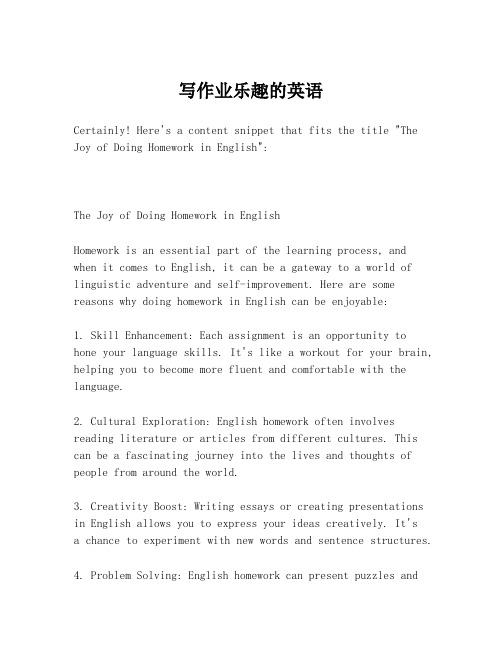
写作业乐趣的英语Certainly! Here's a content snippet that fits the title "The Joy of Doing Homework in English":The Joy of Doing Homework in EnglishHomework is an essential part of the learning process, and when it comes to English, it can be a gateway to a world of linguistic adventure and self-improvement. Here are some reasons why doing homework in English can be enjoyable:1. Skill Enhancement: Each assignment is an opportunity to hone your language skills. It's like a workout for your brain, helping you to become more fluent and comfortable with the language.2. Cultural Exploration: English homework often involves reading literature or articles from different cultures. This can be a fascinating journey into the lives and thoughts of people from around the world.3. Creativity Boost: Writing essays or creating presentations in English allows you to express your ideas creatively. It'sa chance to experiment with new words and sentence structures.4. Problem Solving: English homework can present puzzles andchallenges, such as understanding complex texts or constructing a well-argued essay. Solving these problems can be incredibly satisfying.5. Personal Growth: As you progress through your English homework, you'll notice your abilities improving. This sense of achievement can be very rewarding.6. Preparation for the Future: English is a global language, and being proficient in it can open doors to future opportunities, both academically and professionally.7. Mindfulness Practice: Focusing on your homework can be a form of mindfulness, helping you to concentrate and be present in the moment.8. Fun with Friends: Collaborating on group projects or discussing homework with classmates can turn a solitary task into a social event.9. Self-Discovery: Through the process of learning and doing homework, you might discover new interests or passionsrelated to the English language.10. Sense of Accomplishment: Completing your English homework successfully gives you a sense of accomplishment, which is a great motivator for continued learning.Remember, the key to finding joy in doing homework is to approach it with a positive attitude and a willingness to learn and grow. So, grab your pen and paper, or open yourlaptop, and dive into the enriching experience of English homework!This content is designed to inspire students to see the value and enjoyment in doing their English homework.。
乐于做某事英语高级表达

乐于做某事英语高级表达In the vast expanse of life, there are endless delights that await us, hidden behind the curtains of everyday existence. Among these joys, the pleasure of engaging in activities that we truly love stands tall, casting a shadow of fulfillment and happiness over our existence. To delve into the depths of our passions, to embark on a journey of discovery, and to relish in the pure joy of doing what we love, is to find ourselves in a state of euphoria, where the world seems to shrink and the only thing that matters is the pure, unadulterated bliss of the moment.For me, one such activity that brings immense joy is exploring the unknown, particularly when it comes to languages and cultures. To delve into the rich tapestry of words, to unravel the intricate threads of grammar, and to immerse oneself in the rich cultural heritage of a foreign land is to embark on a journey that is both exciting and enlightening. The thrill of discovering new words, understanding complex sentence structures, and grasping the subtleties of a foreign language is unparalleled. It is an experience that transforms one's perspective, opens up newhorizons, and broadens one's horizons in ways that are both profound and transformative.Moreover, the joy of learning a new language is notjust about mastering the linguistic skills but also about connecting with people, understanding their culture, and experiencing their way of life. Language is not just a tool of communication; it is a bridge that connects people, a medium that allows us to share our thoughts, feelings, and experiences with others. To be able to speak someone's language, to understand their culture, and to appreciate their way of life is to build a bridge of understanding and respect that transcends boundaries and brings people together.The same applies to exploring different cultures. To delve into the rich history, traditions, and customs of a foreign land, to understand the values and beliefs that shape its people, and to experience the unique flavors, art, and music of that culture is to embark on a journey of discovery that is both fascinating and enriching. It is an experience that broadens one's horizons, opens up new perspectives, and allows us to appreciate the diversebeauty of the world in ways that are both profound and transformative.In conclusion, the pleasure of engaging in activities that we truly love is one of the greatest joys of life. To delve into the depths of our passions, to embark on a journey of discovery, and to relish in the pure joy ofdoing what we love is to find ourselves in a state of euphoria where the world seems to shrink and the only thing that matters is the pure, unadulterated bliss of the moment. For me, exploring the unknown, particularly when it comesto languages and cultures, is one such activity that brings immense joy and fulfillment. It is an experience that transforms me, opens up new horizons, and allows me to appreciate the diverse beauty of the world in ways that are both profound and transformative.**乐于探索未知:跨越文化与语言的界限**在生命的广阔天地中,隐藏着无数等待我们去发现的乐趣。
初中英语中含反身代词的固定短语

练习:
① Although Mary is only four, she could____ .
A. dress herself
B. teach herself
C. say to herself
②He has a lot of money, but he doesn’t____ very much.
make oneself at home make oneself at home 意为“别拘束,别客气,请随意”。 例如: Tom, come in and make yourself at home. 汤姆,快进来,别拘束。 We were asked to make ourselves at home at dinner. 晚餐上,主人叫我们不要客气。
A. help himself
B. enjoy himself
C. teach himself
③When you are in a self-service restaurant, you can_____to the food.
A. dress yourself
B. make yourself
C.n sth. lose oneself in sth.意为“沉迷/陶醉/迷失在……中”。 例如: He lose himself in computer games all day. 他整天沉迷于电脑游戏。 Take care not to lose yourself in the woods. 小心别在树林里迷路。
keep sth. to oneself
keep sth. to oneself意为“保守秘密,不要 把……讲出来”等。 例如: There’s one thing you can do for me, but you must keep it to yourself. 有件事需要你帮我做,但你必须得保密。 Don’tworry. I’ll keep this news to myself. 你放心,我不会把这个消息讲出去的。
Unit6Topic3知识点整理九年级英语下册
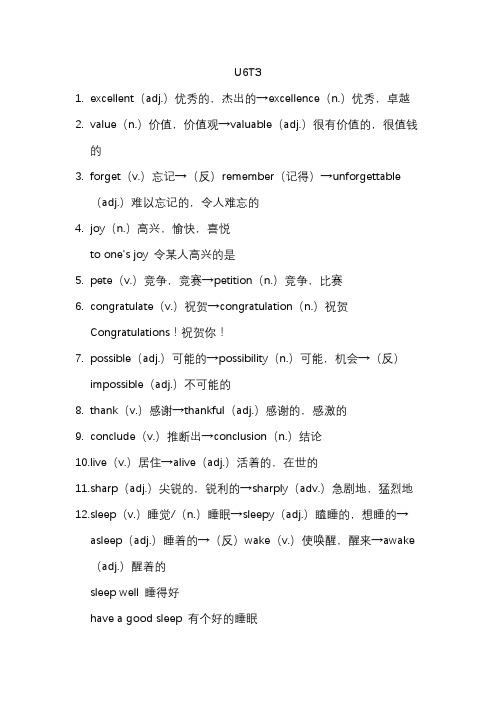
U6T31.excellent(adj.)优秀的,杰出的→excellence(n.)优秀,卓越2.value(n.)价值,价值观→valuable(adj.)很有价值的,很值钱的3.forget(v.)忘记→(反)remember(记得)→unforgettable(adj.)难以忘记的,令人难忘的4.joy(n.)高兴,愉快,喜悦t o one’s joy 令某人高兴的是5.pete(v.)竞争,竞赛→petition(n.)竞争,比赛6.congratulate(v.)祝贺→congratulation(n.)祝贺Congratulations!祝贺你!7.possible(adj.)可能的→possibility(n.)可能,机会→(反)impossible(adj.)不可能的8.thank(v.)感谢→thankful(adj.)感谢的,感激的9.conclude(v.)推断出→conclusion(n.)结论10.l ive(v.)居住→alive(adj.)活着的,在世的11.s harp(adj.)尖锐的,锐利的→sharply(adv.)急剧地,猛烈地12.s leep(v.)睡觉/(n.)睡眠→sleepy(adj.)瞌睡的,想睡的→asleep(adj.)睡着的→(反)wake(v.)使唤醒,醒来→awake (adj.)醒着的sleep well 睡得好have a good sleep 有个好的睡眠feel sleepy 感觉瞌睡的fall asleep 睡着,进入梦乡13.t rue(adj.)真实的,真的→truth(n.)真相,实情,事实to tell the truth 说实话14.a ppear(v.)出现,显现→appearance (n.)出现,起源,外观15.a rgue(v.)争论,争吵→argument(n.)争论,争吵16.m ud(n.)泥浆→muddy(adj.)浑浊的,多泥的17.f irst of all 首先18.d ozens of 很多,许多19.i n a hurry 匆忙地20.i n time 及时,来得及on time 准时21.g raduate from从……毕业22.g et ready for 为……做好准备23.H ow time flies!时光飞逝!24.T ake it easy.别紧张25.w ork hard 努力学习26.t here will be able to do sth.将能够做某事27.g ive a speech 做演讲28.I f so 如果这样29.n ot only……but also……不仅……而且……30.I have learned not only how to study , but how to be a man.我不仅学会了如何学习,还学会了如何做人。
八下 unit9 单词讲义
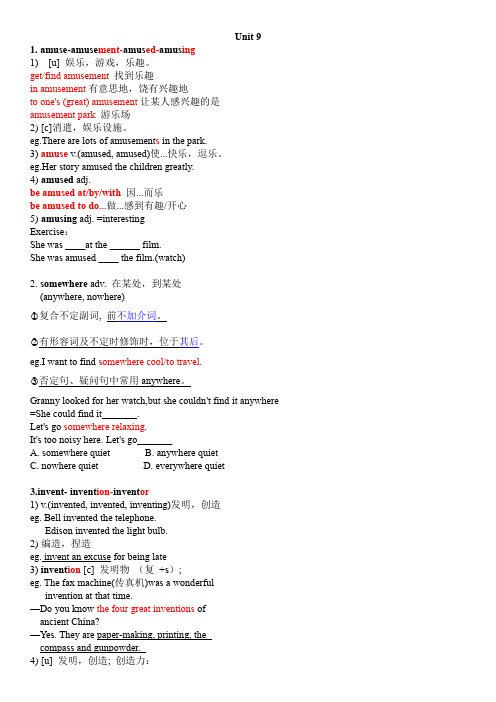
Unit 91.amuse-amuse ment-amus ed-amus ing1) [u] 娱乐,游戏,乐趣。
get/find amusement 找到乐趣in amusement有意思地,饶有兴趣地to one's (great) amusement让某人感兴趣的是amusement park游乐场2)[c]消遣,娱乐设施。
eg.There are lots of amusement s in the park.3) amuse v.(amused, amused)使...快乐,逗乐。
eg.Her story amused the children greatly.4)amused adj.be amused at/by/with因...而乐be amused to do...做...感到有趣/开心5)amusing adj. =interestingExercise:She was ____at the ______ film.She was amused ____ the film.(watch)2.somewhere adv. 在某处,到某处(anywhere, nowhere)○1复合不定副词, 前不加介词。
○2有形容词及不定时修饰时,位于其后。
eg.I want to find somewhere cool/to travel.○3否定句、疑问句中常用anywhere。
Granny looked for her watch,but she couldn't find it anywhere =She could find it_______.Let's go somewhere relaxing.It's too noisy here. Let's go_______A. somewhere quietB. anywhere quietC. nowhere quietD. everywhere quiet3.invent- invent ion-invent or1) v.(invented, invented, inventing)发明,创造eg. Bell invented the telephone.Edison invented the light bulb.2)编造,捏造eg. invent an excuse for being late3) invent ion [c] 发明物(复+s);eg. The fax machine(传真机)was a wonderfulinvention at that time.—Do you know the four great inventions ofancient China?—Yes. They are paper-making, printing, thecompass and gunpowder.4)[u] 发明,创造; 创造力:the invention of gunpowdera man of much invention 富有创造力的人5) n. invent or. 发明家eg. An inventor may invent many inventions.6) discover: 发现(已存在的事物)e.g. Columbus discovered the New World in 1492.invent or, act or, visit or, translat or, sail or, protect or, profess or5.progress-progress ive1) v. 进步,进展eg. As the war progressed, his life became hard.He progressed well in school.2)[u] 进步make (rapid) progress取得进步be in progress 在进行中3)adj. progress ive 进步的progressive ideas例题:---Why is Harry's mother so happy?---Because only three students_____, ____his son Harry.A.failed the exam; besidesB. made progress; exceptC. made progress; includingD. passed the exam; without6.rapid- rapid ly1) adj. 迅速的,快速的(物体或事情变化快)eg. She made a rapid decision.2) quick adj./adv. 动作快,行动机敏eg. I have to do some quick thinking.(赶紧想想)3) fast adj./adv. 速度快I can run as fast as him.4) rapid ly adv. 迅速地eg. The color turns rapidly.例题:He progressed in _______way.A. so a rapidB. a so fastC. such a rapidD. a such quickual-un usual- usual ly1) adj.不同寻常的,特别的an unusual day2) usual adj. 平常的He gets to school as usual(像平常一样).3) usual ly adv. 通常例题:____ unusual musician he is! All of us are losing ourselves in his music.A. HowB. What anC. How aD. What8. toilet n. 厕所bathroom (书面)厕所W.C.(Water Closet ) 冲水厕所public lavatory公厕9. encourage-encourage ment-encourag ing(ly)1) encourage sb. to do sth.eg. They encouraged all the members to take part in the activity.2) encourage ment n. 鼓励eg. He said a few words of encouragement.3) encourag ing adj. 鼓励的,促进的eg. It's encouraging to receive a good report on study.4) encouraging ly adv. 鼓励地eg. He nodded (点头) encouragingly.例题:His parents often encourage him____hard.A.workB. workingC. to workD. works10.social-society1) adj. 社会的social groups社会团体eg. We should organized more social events/ activities.2) society n. 社会go into society 进入社会modern society 现代社会11.peace-peace ful-peaceful ly1) peace ful adj. 和平的,安宁的(more, most)eg. She spent a peaceful afternoon by the river.2)peace n. 和平war and peacein peace 和平地,不受打扰地Leave me in peace.别来打扰我。
初三英语(师大版)U3 Lesson 9 Creative Minds 2
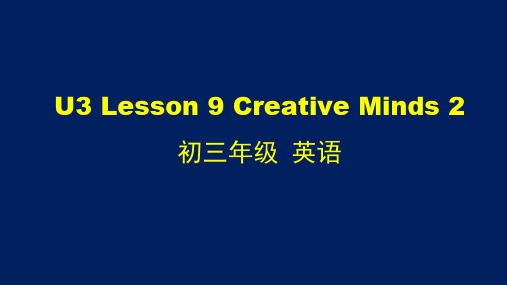
important to wear a hat when it’s cold.
Language Focus
1. Because of this he couldn’t drink it any more, but he could eat it. 因此,他不能再喝它(饮料)了,但是他能吃它。 not … any more, 意为“再也不;不再”,常用于否定句和疑 问句末。
Cause and Effect Relationship
1. These ice sticks became popular among kids at school in summer because they were delicious and helped them stay cool.
如:She doesn’t live here any more. Why doesn’t he speak to me any more?
Language Focus
2. All these inventions have one thing in common — the kids were
trying to solve problems in their lives. 所有的这些发明有一个共同点——孩子们在试着解决生活中的 问题。 have … in common, 意为“有……共同点;相同”。如: Jane and I have something in common — we like
Review the passage. What inventions are mentioned?
2020-2021学年牛津译林版版英语八年级下册词汇创新拓展学习法(第99组)
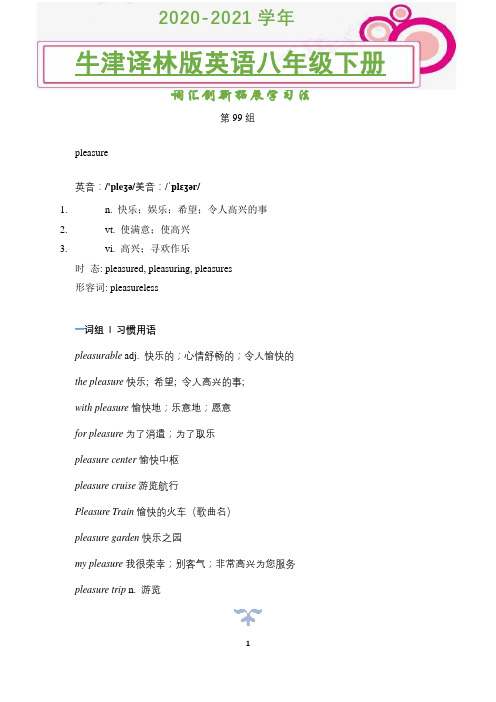
词汇创新拓展学习法第99组pleasure英音:/'pleʒə/美音:/ˈplɛʒər/1.n. 快乐;娱乐;希望;令人高兴的事2.vt. 使满意;使高兴3.vi. 高兴;寻欢作乐时态: pleasured, pleasuring, pleasures形容词: pleasureless词组| 习惯用语pleasurable adj. 快乐的;心情舒畅的;令人愉快的the pleasure快乐; 希望; 令人高兴的事;with pleasure愉快地;乐意地;愿意for pleasure为了消遣;为了取乐pleasure center愉快中枢pleasure cruise游览航行Pleasure Train愉快的火车(歌曲名)pleasure garden快乐之园my pleasure我很荣幸;别客气;非常高兴为您服务pleasure trip n. 游览词汇创新拓展学习法网络短语:Pleasures欢沁; 香水; 欢沁香氛; 之源;Parson's Pleasure牧师之乐Pleasurable Red彩玉; 彩红;anticipate pleasure希望愉快Pleasure Brigade成的文娱队However Pleasurable不管多么愉快Unknown Pleasure任逍遥Pleasure Boat游船; 游艇; 游览艇; 游轮;英语例句库1.It's my pleasure to help you.1.帮助你是我的快乐。
2.C-is one of the pleasures of life.2.交往是人生的一大乐趣。
3.It is one of my greatest pleasures.3.这是我最高兴的事之一。
4.The harbour was full of pleasure craft.4.港口满是游艇。
5.Their hosts received them with unfeigned pleasure.词汇创新拓展学习法5.主人带着由衷的喜悦接待了他们。
- 1、下载文档前请自行甄别文档内容的完整性,平台不提供额外的编辑、内容补充、找答案等附加服务。
- 2、"仅部分预览"的文档,不可在线预览部分如存在完整性等问题,可反馈申请退款(可完整预览的文档不适用该条件!)。
- 3、如文档侵犯您的权益,请联系客服反馈,我们会尽快为您处理(人工客服工作时间:9:00-18:30)。
寓乐于教,创造快乐的英语发言人:邓河娇(英语组)亲爱的领导及前辈们,大家下午好!做为一名新老师,能够站在这里,在感到万分荣幸的同时,心里也是忐忑不安、诚惶诚恐的。
在过去的一年里,我所做的只是让各位前辈看起来顺眼而已。
这一路走来,我所遇到的困惑和困难是远要比我所得到的多的多的。
因为有些经验是学不来的,你必须站在那个讲台上用时间去自己慢慢的感受、体会和摸索。
在此,我想谈一下过去几个月中在教学中的一点小的感悟。
我今天发言的题目是“寓乐于教,创造快乐的英语课堂”。
忘各位前辈给予指正和建议。
首先,我想谈一谈我所教的学生在英语这个科目上的学习特点。
一、英语水平参差不一,各不相同对于我所教的班级的学生,有很大一部分来是来自于农村和乡镇的。
虽然现在在小学已开设了英语课程,但由于不是主要科目和师资,教学设施及家庭环境等诸多方面的不同造成了学生英语水平的参差不齐。
农村和乡镇上来的学生口语表达和词汇是要稍逊于市区学生的,但他们相对较而言较认真也较踏实。
相对农村和乡镇上的而言,另一部分来自市区的学生的口语和词汇量较好,但在学习中不刻苦。
所以,学生英语水平在班级里是不尽相同的。
因此,英语仍是一门起始课程。
二、学生学习的积极性不高,兴趣不浓厚进入初中阶段,英语作为一门主要科目,相对于小学而言,开始进行系统的全面的学习。
学习之初,学生们的学习兴趣较浓。
但随着时间的推移,由于英语本身还是一门文科性的学科,要记忆和背诵的东西相对于其他学科是较多的。
所以在此过程中把他们对于这门科目的新鲜和好奇随之慢慢消磨掉了。
另外随着知识量逐日增加,部分自律性较差的学生由于拖欠以前的功课开始跟不上上课的节奏,随之压力也逐渐增大。
另外英语作为一门语言类的学科,要说要听要表达,有的乡镇上来的学生刚开始上英语课时是不愿意开口说英语的,这些学生由于课堂内外的表现落后于别人,表现出一种十分焦虑的心态。
这种心理障碍对英语学习的积极性产生了影响,开始在课堂上表现出一种破罐子破摔的消极情绪。
三、自学和自律能力较差初中作为一个转型的时期,其学习环境和学习方式产生了较大的变化。
很大一部分学生开始住校,相对于小学来说,要求学生有较强的自学和自律能力。
我所教授的学生极大一部分表现出自学自律能力差或根本不具备自学自律能力。
对于他们的学习,如果教师盯的不紧的话,他们是根本不会自己操心的。
特别是对于英语,它作为一门外语,是一门语法和词汇完全异于母语的语言,对于大部分学生,课堂几乎成了他们学习英语多的唯一途径。
在英语学习中,单词和句子的记忆很大一部分是需要学生利用课余时间完成的,大一部分学生由于自律能力差,也不会花时间去记忆,所以很快就跟不上课堂节奏了。
还有一些基础差的学生由于初期对于单词记忆的难度产生了恐惧,干脆放弃了。
所以这些情况都加大了英语教学的难度。
根据学生的特点,在英语教学中把握学生的特点和教学的难点,我觉得应该把新鲜的元素引入英语课堂,提高他们学习英语的兴趣才能创设良好的英语学习氛围。
为什么有的我们在做自己喜欢的事情的时候,即使几天几夜不休息仍然精神抖擞,我想兴趣在其中是占了很大一部分主导因素。
所以提高他们的兴趣是不容护忽视的。
第一、学习环境对于我们现在学生来说,英语课堂几乎是他们接触英语的主要场所。
因此,在课堂教学中就要努力创设贴近学生实际的活动,组织开展高效的教学活动,引导学生通过活动去体验、感悟、发现和探究,激发学生学习英语的兴趣,提高学生学习和运用英语的能力,找到学习英语的好方法,从而提高课堂教学效率。
学生只有在具体的语言情景中才能感受到所讨论的主题以及所使用语言的意义,才有可能在情景中进行话题的交流与讨论,让初中英语课堂教学必须尽最大限度地引起学生的学习兴趣,为学生提供足够的机会用英语进行活动,让学生感受到运用所学语言成功地达到某种目的后的愉快。
这是学生的年龄特点和英语学科的特殊性所决定的。
要使中学生能够在40分钟的时间内保持良好的学习状态,教师必须根据不同的教学内容创设各种情景,做到教学情境化。
例如在Where is my schoolbag? 这一课里,主要是让学生们表述东西的所在方位的,就可以就近利用他们周围所熟知的一些物品,让他们看着这些东西口头表述出来,还可以在教学过程中穿插个找东西的小游戏,样即激发了他们的兴趣又训练了新句型和他们的口语表达能力。
还有第七单元How much are my socks?这一课这要是让学生掌握进入商店时买东西的基本句型。
我当时就在黑板上画了一些商品,让一些学生上来扮演售货员的角色,其他的学生扮演购买者,让他们用本课所学的句型进行对话。
这样创造一个模拟的环境,让他们知道这样要用在什么样的场合和该怎么用。
另外在讲到与英美文化相关的一些内容时,可以适当穿插一些讲英美风情、习俗、典故的小故事来增加课堂的趣味性。
第二、适当运用信息技术突破重点难点。
教师应该根据英语教学的实际教学内容,利用多媒体将所呈现的学习内容、进行收集、加工、分析、处理、整理,为学生创设一种直观形象、生动有趣便于理解记忆的语言环境和语言交际情景的场面。
并让学生在这种情境中探索、发现,在特定的情境中理解事物本身,这样就有助于加强学生对学习内容的理解,使课堂教学静态化动态为,化枯燥为生动。
降低了学习难度,使教学难点得以顺利突破,教学重点得以顺利解决。
学生也为其形式新颖,声画之精彩耳目一新,并逐步培养了学生自己发现问题,和解决问题的能力。
When is your birthday? 时,课文的主要内容是让学生学会表达一年中的日期和相互询问生日,内容相对比较枯燥。
在学习课文时,我利用多媒体展示几个他们所熟悉的明星和卡通人物的生日,让他们用英文表达卡通人物的生日,这样不仅引起他们的兴趣而且达到训练的目的。
让他们运用到英语学习环境中来,激发学生的求知欲和好奇心,在这种情况下进入新句型的教学就不会显得枯燥。
在这个过程中我们可以让学生分小组合作学习,在一问一答的的基础上,再让学生回到现实中来,让他们模仿在电脑里所看到的情景进行对话结合自己的生日进行回答。
在这种轻松和谐的氛围中,既让学生理解和掌握了所学知识,突破了重难点,又促进了学习能力的提高。
再如,在上I like bananas.这个单元时,有很多食物方面比较难记忆一些的单词,象汉堡包,草莓,鸡肉、梨子,等等。
这些单词学生单独记忆时学起来枯燥为此我找了一段关于食物的动画,让他们看完动画后把所看到的单词写下来,比赛看哪个组收的又快有多。
并制作了一系列有关这些食物的课件,让学生看图片,读单词。
教师点击图画中设有单词的动画,让学生看实物图片读、记单词。
有趣的画面和镜头吸引了学生的注意力,加深了他们对单词的印象。
同时引导学生说一些分别包含这些单词的日常用语,学生的情绪一下子调动起来。
在图文并茂的图画中,学生学得开心,思维敏捷。
既锻炼了学生语感交际能力,又复习巩固了新旧单词。
学生边看边听,边学边练。
第三、小组合作,让课堂变成学生学习的舞台小组合作几乎是长期以来英语教学中一种屡试不爽的方式。
初中英语课堂上采取合作学习有利于学生高效学习,提高学生口语表达的能力。
但怎样合作就成了一个重点及难点了。
在进行合作学习时,要明确学习任务与目标,明白这次合作学习要解决哪些问题,使教学达到什么效果,通过共同参与探究、讨论,相互启发、互补,以集中智慧解决个体无法解决或短时间内难以解决的问题。
用很短的时间,协调合作的方法,积极实践、动手操作,提高小组合作学习的效率,完成学习任务。
交流学习,共同达标,体验快乐。
同时又调动了课堂气氛。
使学生爱学习,会学习。
苏霍姆林斯基说过:“兴趣的源泉在于运用。
”发展学生学习英语的能不仅在于课堂,还在于课外。
为了增强学生学习英语的兴趣,给学生更多的运用英语进行交际的机会,可以设计和组织多种难易适度的课外活动。
通过活动可以让学生把所学知识运用于实际,使学生认识了自我,取得了不同程度的成就感,增强其自信心,增添了学习英语的兴趣和乐趣,变“要我学”为“我要学”,进而长久保持其对英语学习的兴趣。
我在布置课外作业时,除了要求学生完成必要的背诵和练习外,我会适当组织一些其他的课外活动,英语演讲竞赛、游戏、办英语周报游戏等活动。
鼓励学生在这些活动中模仿和创造自己的东西,促使学生有目的地主动地在课后去准备和练习。
生动有趣的课外活动,一方面能引导学生互相帮助,互相督促,共同提高,把团结协作精神化作学习英语的动力,以弥补课外学生因自觉性差,缺少督促和辅导的缺憾,另一方面,这类活动,为学生创造提供更多的英语复现机会,对学习内容印象更深,使所学的英语知识得到强化和巩固的效果。
教师作为教学活动的组织者和促进者,要掌握一定的技巧,做一个成功的引导者、促进者,以学生的发展为目标,实现有效的英语高效课堂教学。
第五、教师的评价美国心理学家威廉·詹姆斯说:“人类最深的企图之一是期望被赞美、钦佩和尊重。
”渴望赞扬是每个人内心的一种基本愿望。
教师的评价能使学生感受到教师对他们的尊重和关心。
特别是对于我所教的大部分学生其实对他们的口语和其他方面的表达能力是比较自卑的。
以前没发现他们在意这些的时候,当他们说的不好的时候老是批评他们,后来有一次私下里我问为什么他们在课堂中他们不愿意举手,有一个学生就告诉我说当他们说得不好的时候我老是批评他们,所以就不敢举手了。
所以我就尽量让自己多说赞赏的语言,如:“Good!”“Excellent!”“You are great/good!”后来发现这些回答问题的学生都带着一个满足的微笑做下去了。
对于那些平时基础差的学生,假如你发现这他们学习有进步,不要放过赞扬的机会。
这样会让学生在课堂上找到成就感,增强他们的信心。
鲁迅先生说过:“没有兴趣的学习,无异于一种苦役;没有兴趣的地方,就没有智慧和灵感。
兴趣是一种具有积极作用的情感,而人的情感又总是在一定的情境中产生的”。
现代教学媒体为学生提供形象生动、色彩鲜艳、声音清晰的感知材料,产生愉悦的视听效应,使学生的多种感官同时刺激,从而产生浓厚的学习热情和学习兴趣。
总之,英语是相对而言还是一门有趣的学科,如果我们能注意挖掘潜藏在英语中的宝藏,不断提高英语教师自身的授课水平,努力创设生动活泼的教学情境,精心设计教学环节,努力创设民主、宽松、和谐的课堂氛围,注意培养学生的学习兴趣,那学生肯定会越来越喜欢英语,成绩也会越来越好的。
我的发言完毕,谢谢。
